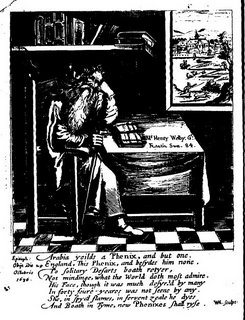
Ho-hum: reading again: this time, a posthumous biography of a man who did nothing, but whose culture could find abundant terms in which to praise his doing of nothing:
The Phoenix of these late times: or the life of Mr Henry Welby, Esq. who lived at his house in Grub-Street forty foure yeares, and in that space was never seene by any… whose portracture, you may behold, as it was taken at his death (1637).
Henry Welby lived, for the last 44 of his 84 years, in three back rooms of his house in London’s Grub Street. He retreated to this solitude after a quarrel, in which a younger brother traumatised him by attempting his murder (a double-charged pistol, which only 'flashed in the pan', was discharged). Up to this point, Welby had been a student, had travelled abroad, married, had a daughter, seen the daughter married. After it, at the age of 40, he turned inward, and thereafter, his biographer asserts, was only ever seen by an elderly maid when her cleaning left him no innermost sanctuary to retreat to. Her death seems to have precipitated his, which followed six days after that of his only human contact in his last four decades.
His biographer was Thomas Heywood, whose abundance of historical anecdotes and facility for moralising allowed him to fill the pages that recount a quite mysterious life. Necessarily sparse biographical details do emerge, doled out with suitable sparingness by Heywood. For Welby apparently existed on oatmeal gruel, salads, bread, and the occasional egg-yoke, while he drank mainly ‘four shilling beer’, which the context suggests must have been of the thinnest kind; just occasionally varied by ‘the milk of a red cow’, brought to him hot from the udder when he made the request.
More remarkably, Heywood asserts that at Christmas and Easter, all the food for a proper feast would be served into Mr Welby’s outermost room, where he dined. This food he would then carve, and send out to be distributed to his neighbours, without his eating any of it himself. This does look like a supreme display of will-power by an obstinate man, one, moreover, who wants his determination to be known.
The next room in from his dining room was his bedroom, and the last and innermost of his three rooms was his study: the recluse was further away in his books than in his bed. Heywood only says that Welby was a scholar and a linguist, and always bought the best books available, English and foreign, but doesn’t give any idea of their precise nature or how they were acquired, whether sent to him on approval or ordered via an intermediary servant. If he forsook the world in 1592, he managed to ignore the whole of (say) Shakespeare’s creative maturity as a London dramatist. He really should have got out more.
Heywood assumes that he spent time praying, and dutifully praises his abstinence and continence. But there is one outburst against this unnatural existence:
Now as touching the solitude of his life, to spend so many Summers and Winters in one small and narrow roome, dividing himselfe not onely from the societie of men, but debarring himself from the benefit of fresh and comfortable aire; not to walke or confer with any man, which might either shorten the tediousnesse of the night, or mitigate the prolixnesse of the day: what retirement could be more? In my opinion it far surpasseth all the Vestals and Votaries, all the Ancresses and Authors that have beene memorized in any Hystorie.
I am amused by the way ‘authors’ appear alongside anchorites as solitaries, and the odd male-centeredness here about the sex a suitable companion for shortening the tediousness of a night.
How the book came to be written isn’t explained. For Heywood, Welby is a wonder, a solitary phoenix, and the book might have satisfied a few nosy parkers and local gossips. Moralisation largely fills the cracks where genuine inquiry might have wriggled into view: Heywood – a dramatist who worked in each of the reigns of Elizabeth, James, and Charles – is devoid of psychological speculation, in the way they all tended to be. ‘What makes a man tick?’ – W. H. Auden seems to have originated the phrase in the 1930’s: in many centuries before, people, even writers, functioned quite adequately without wanting to get at the main spring. It doesn’t occur to Heywood that the murderous brother might have had his provocations: Welby becomes a kind of saint by his long-avoidance of humanity.
The title page portrait is surprisingly well cut, almost as though Welby had, after all, wanted his story to be told, and his long-concealed face to be seen, and left a commission. He looks, perhaps deliberately, like a strange London version of a St Jerome, a bearded saint among his books.
I am clean shaven, myself.

No comments:
Post a Comment